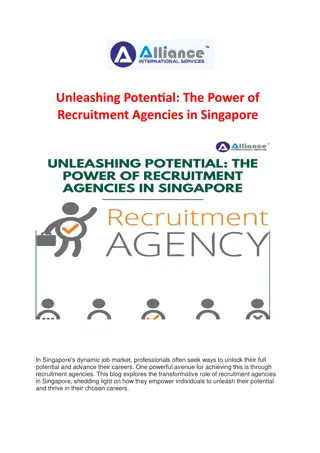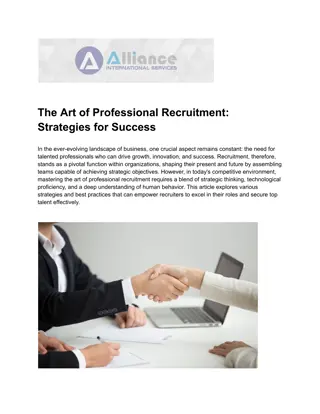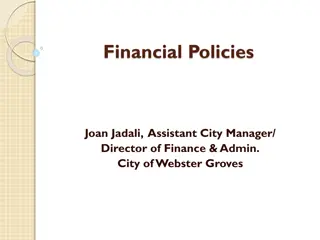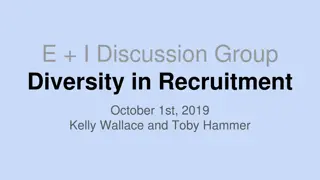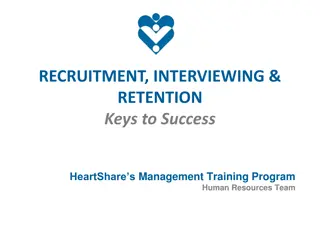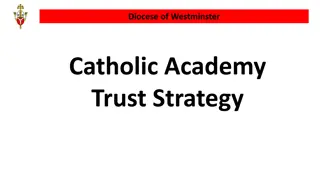Positive Action Policy for Inclusive Recruitment at Westminster City Council
Reminder of Westminster City Council's Positive Action Policy for all Band 4 and above roles, emphasizing the importance of diversity in recruitment processes, mandatory training on unconscious bias and inclusive recruitment, and guidance for hiring managers on implementing positive action practices in line with the Equality Act 2010.
Download Presentation

Please find below an Image/Link to download the presentation.
The content on the website is provided AS IS for your information and personal use only. It may not be sold, licensed, or shared on other websites without obtaining consent from the author. Download presentation by click this link. If you encounter any issues during the download, it is possible that the publisher has removed the file from their server.
E N D
Presentation Transcript
POSITIVE ACTION POLICY INCLUSIVE RECRUITMENT WCC
REMINDER OF OUR POSITIVE ACTION POLICY FOR ALL BAND 4 AND ABOVE ROLES All band 4 plus recruitment including secondments must comply with Positive Action Policy. This includes any Exec Search recruitment campaigns. Speak to your HRBP or Strategic Resourcing Lead for further support or advice. You must have a diverse recruitment panel from the very beginning to include representation of gender and ethnicity. Complete the Job Posting Template with names of your diverse panel members, and cc your Strategic Resourcing Lead, Juliana Watters All panel members are equal and can be from different band levels and business areas. Everyone is accountable and responsible to ensure a fair and robust process is followed. Agree as a panel, the criteria of the role from the outset, what good looks like and what is expected to be demonstrated at each stage by candidates. jwatters@westminster.gov.uk jwatters@westminster.gov.uk Secondments are opportunities expected to be MORE than 3 months and must all be advertised via IBC and follow the same process as permanent recruitment. Additionally, you can share all opportunities via staff networks, Yammer etc, An opportunity LESS than 3 months is Acting Up this is an operational short-term need eg parental leave. All vacancies should be advertised internally for a period of 2 weeks to allow our internal staff the opportunity to apply. If you need further advice speak with your HRBP or Strategic Resourcing Lead. Your recruitment panel must shortlist at least one identified BAME candidate. If you are unable or choose not to, including if you have only one candidate that doesn t identify as BAME, you must suspend recruitment and discuss your options with Stuart Love before continuing with the process. Further advise speak with your HRBP or Strategic Resourcing Lead
MANDATORY TRAINING To better show our commitment to working the Westminster Way and each of its three pillars, we have taken the unusual step of making the Unconscious Bias Training and the Inclusive Recruitment Training mandatory for all managers, staff with hiring responsibilities or are looking to hire. You can register for the full day workshop by visiting the Learning Hub. You will not be able to proceed with the recruitment process unless you have attended the full day workshop.
FOLLOWING SLIDES The following slides are guidance for hiring managers and their recruitment panel. The Equality Act 2010 Who is affected by the Act What is Positive Action In practice how does this work What does equal merit mean WCC s Positive Action Policy Examples making appointments
THE EQUALITY ACT 2010 The Equality Act 2010 replaces the previous antidiscrimination laws with a single Act. It simplifies the law, removing inconsistencies and making it easier for people to understand and comply with it. It also strengthens the law in important ways to help tackle discrimination and inequality. This quick start guide is intended to help employers understand how they can use new positive action provisions to improve diversity in their workforce when recruiting and promoting candidates. The provisions came into force on 6 April 2011 The Equality Act 2010 brings together, harmonises and, in some respects, extends existing equality law. It aims to make the law more consistent, clearer and easier to follow in order to make society fairer. The positive action provisions, relating specifically to recruitment and promotion in employment, came into force on 6 April 2011. This guide is to help you understand when and how you use the new positive action provisions when recruiting and promoting candidates
WHO IS AFFECTED BY THE ACT The Act protects people from being treated less favourably because they have a protected characteristic. The relevant protected characteristics in employment are: age disability gender reassignment marriage and civil partnership pregnancy and maternity race (including ethnic or national origins, colour and nationality) religion or belief (including lack of belief) sex sexual orientation Positive action applies to all these protected characteristics. Positive action provisions mean that it is not unlawful discrimination to take special measures aimed at alleviating disadvantage or under- representation experienced by those with any of these characteristics.
WHAT IS POSITIVE ACTION WHEN IT APPLIES TO RECRUITMENT AND PROMOTION? The positive action provisions mean that it is not unlawful to recruit or promote a candidate who is of equal merit to another candidate, if the employer reasonably thinks the candidate: has a protected characteristic that is underrepresented in the workforce or that people with that characteristic suffer a disadvantage connected to that characteristic. However, positive action does not allow an employer to appoint a less suitable candidate just because that candidate has a protected characteristic that is under-represented or disadvantaged. The Act contains new provisions to allow positive action specifically in the process of recruitment and promotion, in limited circumstances.
IN PRACTICE, HOW DOES THIS WORK? In practice it allows an employer faced with making a choice between two or more candidates who are of equal merit to take into consideration whether one is from a group that is disproportionately under-represented or otherwise disadvantaged within the workforce. This is sometimes called either a tie-breaker or the tipping point . But this kind of positive action is only allowed where it is a proportionate way of addressing the under-representation or disadvantage.
WHAT DOES EQUAL MERIT MEAN? In order to use positive action in a tiebreaker situation, the employer must first establish that the candidates are of equal merit. Employers should establish a set of criteria against which candidates will be assessed when applying for a job. This can take into account a candidate s overall ability, competence and professional experience together with any relevant formal or academic qualifications, as well as any other qualities required to carry out the particular job. However, employers should ensure that any criteria do not indirectly discriminate against people who share a protected characteristic e.g. a requirement that staff must work shift patterns that mean they have to be on-call at certain fixed times might put women, who are more likely to be responsible for childcare issues, at a disproportionate disadvantage. This would be unlawful indirect discrimination unless it could be shown that the need for these work patterns could be objectively justified. Employers must consider whether candidates are of equal merit in relation to the specific job or position they are applying for. While two candidates may be considered to be of equal merit for one particular post, the same two candidates might not be equally suitable for another.
WESTMINSTER WESTMINSTER CITY COUNCIL CITY COUNCIL POSITIVE ACTION POLICY IN RECRUITMENT WHAT YOU NEED TO KNOW & DO
APRIL 2019 OUR PAY GAP STATISTICS It was in April 2019,Stuart Love and ELT members announced WCC salary figures across all bands levels. The statistics proved that there is a need for positive action to ensure that we have a fair representation of both women and BAME at senior level roles within Westminster. The Positive Action Policy and our D&I agenda support us in reducing the pay gaps. Positive Action Policy applies to all band 4 and above vacancies including secondments, excludes acting up opportunities which are no more than 3 months and are for operational short term need only. A fair process should still be carried out. Our D&I agenda went live April 2019. The Council recognises the value of a diverse workforce and is committed to employing staff who reflect the community at large. Our recruitment procedures are designed to promote employment opportunities to all sections of the community, encourage applications from all suitable candidates, and ensure the selection process is based on the ability of the applicant to perform the job advertised
WCC - POSITIVE ACTION POLICY IN RECRUITMENT . We are aspiring to increase the number of staff from underrepresented groups. We are taking positive action to increase the number of staff that identify as Black, Asian and Minority Ethnic (BAME) in senior roles. All hiring managers must ensure that for every band 4 and above vacancy, there must be at least one BAME candidate (where they self-declare and meet the person specification), per shortlist. If you have candidates that have self-declared as BAME, and you do not shortlist any, you must contact Stuart Love to discuss your decision making before proceeding further. Where no candidates self-declare as BAME then you should contact the Recruitment and Resourcing Lead in People Services for further guidance. To support this process and ensure that we have diverse decision making, all hiring managers must ensure that they have diverse recruitment panel at the beginning of the process.ie JD design, shortlisting and interview panels, with a minimum of gender diversity and BAME representation, you should have BAME/gender diversity right at the very beginning stages of the recruitment campaign right up to the appointment stage. Panel members can be from lower band level and /or different business areas to encourage further diversity and different thinking. Every panel member is equal and their experience, comments and views should be treated as such. If you cannot find a suitably diverse panel within your team OR from other business areas, then contact inclusion@westminster.gov.uk / the Organisational Development Team, who will put you in touch with trained members of staff. Job applicants will be shortlisted and appointed on merit and selected based on objective criteria, including the required skills and experience, values and behaviours for the position. Particular care should be taken to ensure that the criteria does not indirectly discriminate against any section of the community.
MAKING APPOINTMENTS - ARTIFICIALLY LOW SCORING THRESHOLDS Appointments should always be made on merit. If one candidate is superior to another the position should be offered to that candidate. If the pass mark in an assessment is set at 70% and one candidate scores 71% and another score 91%, it would generally be wrong to consider that just because both passed the minimum success threshold the two candidates are of equal merit. EXAMPLE A local authority wishes to diversify its workforce and undertakes a large recruitment exercise. In an attempt to create a large pool of qualified people from which it can cherry-pick those with the relevant protected characteristics to make its workforce more diverse, it sets a very low pass mark for the assessment to make sure that a lot of people pass. Picking someone with a particular protected characteristic from the pool in preference to someone who achieved a higher score and was clearly better qualified for the job but didn t have a targeted protected characteristic would not be allowed by the positive action provisions and would be likely to be unlawful discrimination.
EXAMPLE EQUAL MERIT A health and fitness club is faced with making a choice between two applicants for a job as the manager of a leisure facility. One, a woman, has recently completed a Leisure Management Foundation Degree course but has little practical experience. The other candidate is a man who has no formal qualifications but has several years experience of working in leisure centres. Having interviewed both candidates, the employer decides that both could do the job to the same standard but in different ways as each would bring a different set of skills and experiences to the job. Therefore, because the candidates are of equal merit the manager could voluntarily use the positive action provisions when choosing between the candidates and opt to employ the man because all of the other senior positions at the leisure complex were held by women.
EXAMPLE EQUAL MERIT A retailer advertises for a trainee fashion buyer. Among the applicants is a person who has a degree in French. None of the other applicants has a degree in any subject. The fact that one candidate has higher academic qualifications than the others does not automatically make that person better qualified for this particular job. The employer will need to decide if that qualification is a relevant factor in assessing who might do the job as a fashion buyer best.
EXAMPLE An accountancy firm is recruiting for its graduate training scheme. After the first round of assessment the firm decides to shortlist 20 candidates. There is a tie-breaker situation for the 20th place on the shortlist as there are a number of candidates of equal merit. The firm decides to use the positive action provisions to advance a candidate from a BME background to the next round of recruitment, because people from BME backgrounds are under- represented in the firm. This would mean that the non-BME candidates could not claim unlawful race discrimination for not being put on the shortlist. However, it is expected that, in the vast majority of cases, any use of positive action as a tie- breaker between candidates who are of equal merit for a particular post will be at the end of the recruitment process, at the actual point of appointment.













